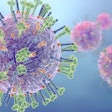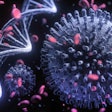
The National Institutes of Health (NIH) has helped to develop a scoring system for long COVID that may benefit efforts to define and study the condition.
People with long COVID, also known as post-acute sequelae (PASC) of SARS-CoV-2 infection, suffer from a wide range of symptoms that present or persist more than 30 days after infection with the pandemic virus. As more than 650 million people have been infected with SARS-CoV-2, even a low rate of long COVID could translate into a significant global public health concern.
Working with the NIH RECOVER Initiative, researchers at Mass General Brigham sought to define the signature symptoms of long COVID and published their findings in JAMA. The team identified a need for a better definition of long COVID because, while multiple earlier studies have assessed the effects of the condition, previous efforts largely had retrospective designs, relied on electronic health record entries, and lacked an uninfected comparison group.
The JAMA paper addresses those limitations. The symptoms identified by the researchers are based on the results of RECOVER-Adult, a prospective study that began enrolling participants in October 2021 with a view to harmonizing data acquisition and building a data-backed definition for long COVID. The study asked people to complete a survey developed in collaboration with clinicians and patient advocates.
More 9,500 individuals completed the survey, answering questions about 37 different symptoms and corresponding measures of severity. The study population included uninfected adults and individuals who were infected with COVID-19 more than six months ago.
Analyzing the responses revealed 12 symptoms that are hallmarks of long COVID. The symptoms include debilitating fatigue that is exacerbated by physical or mental activity, loss of or change in smell or taste, dizziness, and brain fog. Some of the symptoms, such as debilitating post-exertional fatigue, are common to most people with long COVID while others are rarer but still useful for diagnosing the condition.
The researchers used the findings to develop an algorithm that assesses the 12 symptoms and generates an overall “PASC score.” While the PASC score will miss some patients with long COVID, the researchers still see it as a useful tool for improving the diagnosis and treatment of the condition, as Andrea Foulkes, principal investigator of the RECOVER Data Resource Core and professor at Harvard Medical School, said in a statement.
“Now that we’re able to identify people with long COVID, we can begin doing more in-depth studies to understand the biological mechanisms at play,” Foulkes said. “One of the big takeaways from this study is the heterogeneity of long COVID: long COVID is not just one syndrome; it’s a syndrome of syndromes. Understanding this idea is a really important step for doing more research and ultimately administering informed interventions."



















